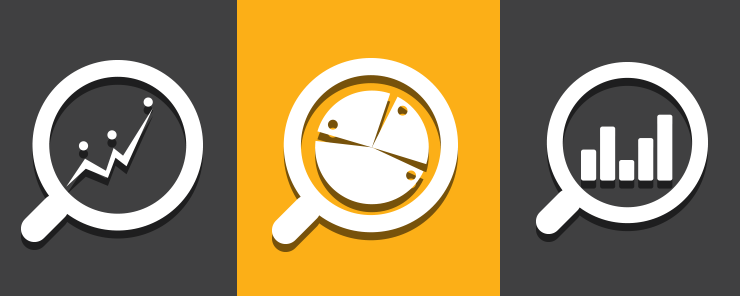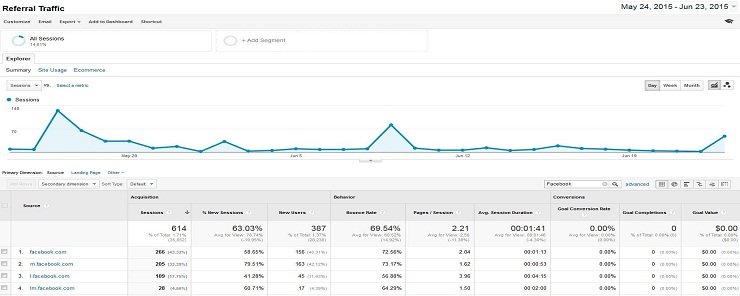A lot of entrepreneurs view their website as a static asset at first. It is what it is, and serves the purposes that it serves, right? Well, the truth of the matter is that a website is a living thing. It requires a lot of attention to function properly, and has the potential to grow. A website owner needs to be aware of the factors that are relevant for a website’s ability to function efficiently and work towards boosting them. In a data driven environment, most businesses need to learn to adapt or sink. Whimsical decision-making has grown out of fashion a long time ago, and it usually leads to some very poor decision making.
The tools website owners use can be very diverse, depending on the strategic goals that they have in mind, but universally speaking, the one that none of them can (and shouldn’t) do without is Google Analytics. While it may seem basic, there is really a lot of depth to this tool if you can use it properly. We are here to discuss its application in different situations and why it has become essential for any competent website owner.
Quality insight
Depending on the primary role your website has within your business organization, you need to have access to relevant metrics which will indicate how successful your website is at that given moment. As a site owner, you don’t get any real insight into how your website is doing without logging on to your Google Analytics account. Still, it is estimated that somewhere around 80% of business owners have insufficient knowledge to use this tool properly. Regardless of this, if you actually set aside the time to study the capabilities of this software you can raise your conversion rate significantly by gaining insight into the source of the traffic, location, devices they use and other valuable signals as well as follow individual signals from landing to conversion and pinpointing breaking points in the sales funnel.
Goals
By setting up specific goals you can actually track various conversion points through various channels. This allows you to calculate your ROI (return on investment) and adjust your tactics in order to get better results. Often, conversion can be improved through very small, seemingly insignificant changes, and Google Analytics can help you with the process of identifying the necessary changes and putting them into practice. It can also help you identify the optimal choice when doing A/B split testing.
You can set up two types of goals. Macro goals are your primary conversion points, which can range from making a sale, to getting a subscription, having a form filled out and so on. On the other hand, the micro goals include secondary conversion points, which are usually related to getting users to engage with a piece of content, video, survey, share something that is of interest to you and so on. They usually do not bring direct revenue, but work as a form of support to your macro goals.
Having both macro and micro goals gives you reports that are more thorough, and allows you to develop multi-channel strategies with more complex conversion points.
Traffic Segmentation
If you set up a solid marketing campaign, you are going to have traffic from all over the place. Unfortunately, not every monetization form benefits from traffic alone. This is why segmentation is important. You need to know which one of your channels for gathering traffic actually brings in the most relevant traffic for you. This will also help you redistribute your marketing finances better, avoid having a high bounce rate and many other benefits. Furthermore, if you want to get close and personalize your approach to fit your clients, you need to have more information about them. Where do they come from? Why are they there? This gives website owners the opportunity to fine-tune their marketing approach and can easily be considered a part of market research.
Annotations
Still, the final goal of using Google Analytics is to gain insight not just into what happened, but why it happened. Having insight into the cause of the numbers (positive or negative) can help you replicate or avoid a certain occurrence. This is where annotations can really help you. There are tons of events that can have a great impact on your conversion and you should definitely include them as annotations in order to track their impact on your overall success.
SEO and Google Analytics
By connecting Google Analytics with your Google Webmasters Tool, you can use SEO reports within GA to gain access to insights, clicks and impressions. By focusing on optimizing your copy for the most active key words you can significantly improve your click through rate (CTA). You should focus on creating a benefit driven copy and make sure that your tags are optimally set up (up to 55 characters for the title and 156 for meta tags). This will get you higher organic traffic that, if properly targeted, has the greatest impact on conversion. With the option to track and create referral reports you can easily expand on your guest blogging campaign, and create better inbound signals.
It would be rather silly to disregard mobile traffic in an age where the majority of users rely on their mobile devices for their browsing needs. You can easily analyse your mobile UX and take actionable, data driven steps towards optimizing its design. You can check if your menus drop down properly without destroying the grid, see which devices have the highest bounce rate and the standard conversion funnel breaking point identification.
The rabbit hole goes even deeper. If you are a prospecting website owner who doesn’t have too much experience with content marketing it can be quite difficult to make decisions and assessment about the quality of the material you are getting and find its weak points. This is why, in your experimentation period, you should rely on GA to see how users interact with your content which will in turn allow you to create a personalized experience for every user. Almost 60% of users say that they find personalised content and ecommerce suggestions useful. Google Analytics provides you with tools and the data to pull this off.
Being familiar with the capabilities and the use of Google Analytics should be basic literacy to any respectable website owner. There is no better way to get access to proper data than this one and the best way to start is to ask a question. Find a business question you need an answer to and then find a way to answer it through Google Analytics. This might seem clumsy at first, and it will require a lot of research, but after you first time around you are going to get a lot of experience and the way you navigate through its interface is going to become more instinctive. Keyboard shortcuts are a thing you should invest time in learning if you intend to use it on a daily basis.
Relying on analytics is actually the only way to escape from formalized solutions which might and might not work for you. You use your data to make decisions and can test things out before you actually invest.







